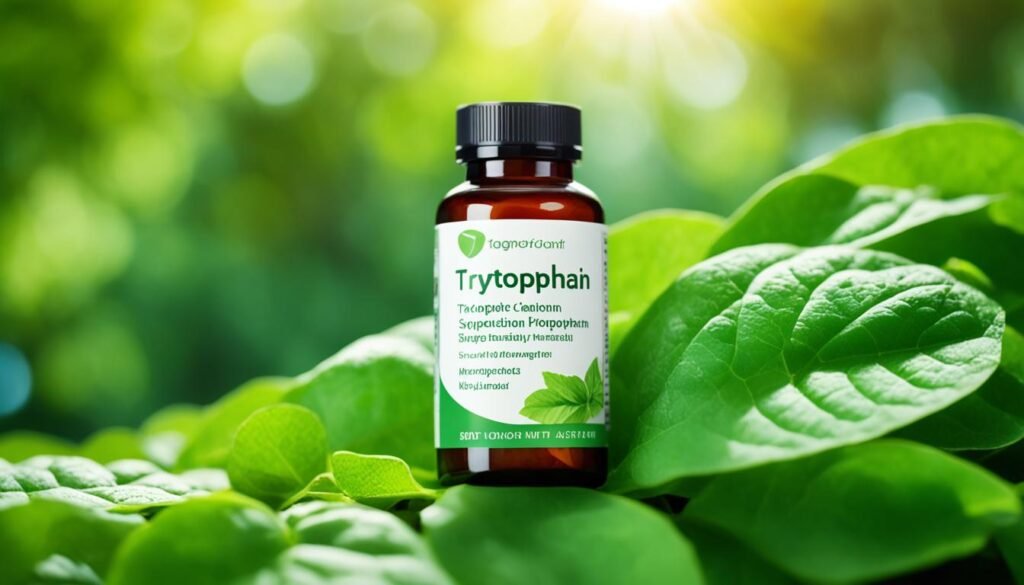Research suggests that you may be able to increase your serotonin levels, a neurotransmitter involved in regulating mood, without medication. Serotonin is known for promoting quality sleep, regulating appetite, and helping with learning and memory. While the link between serotonin levels and mental health conditions like depression is not fully clear, adjusting your diet, getting more exercise, and trying certain supplements could potentially help boost your mood naturally. Additionally, techniques like massage therapy, mood induction, managing stress, and socializing with loved ones may also increase serotonin and improve overall well-being. It’s important to consult with a healthcare professional, especially if you are currently taking any medications that affect serotonin levels.
Adjusting Your Diet
You can’t directly get serotonin from food, but you can get tryptophan-rich foods, an amino acid that is converted to serotonin in the brain. Tryptophan is found primarily in high protein foods like turkey, salmon, and tofu. Eating tryptophan-rich foods with 25-30 grams of insulin-raising carbs may help more tryptophan reach the brain, as carbs can increase insulin levels and influence the transport of tryptophan.
Consuming Tryptophan-Rich Foods
Incorporating more tryptophan-rich foods into your diet, such as turkey, salmon, and tofu, can help provide the building blocks for serotonin production in the brain. These nutrient-dense meals are not only good sources of tryptophan but also offer additional health benefits.
Incorporating Insulin-Raising Carbs
Pairing your tryptophan-rich foods with insulin-raising carbs like whole-wheat bread, brown rice, or oatmeal can help facilitate the transport of tryptophan to the brain, potentially leading to increased serotonin levels and improved mood-enhancing nutrition.
Snack Ideas for Serotonin Boost
Some tasty and serotonin-boosting snacks include whole-wheat bread with turkey or cheese, oatmeal with nuts, salmon with brown rice, and pineapple with crackers. These dietary strategies combine tryptophan-rich foods and insulin-raising carbs to help elevate your mood naturally.
Getting More Exercise
Exercise, especially aerobic activities that get your heart rate up, may help increase serotonin levels and improve mood-boosting exercise. Research suggests that physical activity for depression triggers the release of tryptophan into the blood, creating an ideal environment for more tryptophan to reach the brain and be converted to serotonin production. Beneficial aerobic activities include swimming, bicycling, brisk walking, jogging, and light hiking. Spending just 3 hours per week doing moderate physical activity may be enough to enhance mood according to studies.
Aerobic Activities for Mood Enhancement
Engaging in regular aerobic activities can be a powerful way to experience the endorphin release and serotonin-boosting benefits that exercise provides. Whether it’s swimming laps, going for a brisk walk, or cycling through your neighborhood, aerobic exercise has been shown to positively impact mood and mental health. By incorporating these mood-boosting exercise routines into your lifestyle, you can take meaningful steps towards improving your overall emotional well-being.
Bringing in the Bright Light
Research indicates that serotonin levels tend to be lower in winter and higher in summer and fall, supporting a link between serotonin and seasonal affective disorder. Spending time in sunshine appears to help increase serotonin, as your skin may be able to synthesize the neurotransmitter. To maximize these benefits, aim for at least 10-15 minutes of daily outdoor time. If that’s not possible, using a light therapy box can also help boost serotonin.
Spending Time in Sunshine
Exposure to ultraviolet-B radiation in sunlight creates vitamin D levels that vary, with most Caucasian people producing 50,000 IUs, tanned individuals generating 20,000 to 30,000 IUs, and dark-skinned people yielding 8,000 to 10,000 IUs in a 30-minute period. Low vitamin D levels, related to sunlight exposure, are linked to diseases like rickets in children and bone-wasting conditions such as osteoporosis and osteomalacia. The World Health Organization has endorsed sun exposure for treating skin conditions including psoriasis, eczema, jaundice, and acne through UV radiation exposure.
Using Light Therapy Boxes
For those who can’t get enough natural sunlight, using a light therapy box can also help boost serotonin. Research has shown the efficacy of light therapy for treating mood disorders. However, for individuals with bipolar disorder, it’s important to consult a mental health professional before trying light therapy, as it may trigger manic episodes.
Exploring Nature and Forest Therapy
Spending time in nature through forest therapy has been shown to significantly increase serotonin levels. One study found significant increases in serotonin levels in middle-aged women after engaging in forest therapy. Incorporating more time in natural environments can be a powerful way to elevate mood and well-being.
Trying Mood-Boosting Supplements
In addition to adjusting your diet and lifestyle, certain dietary supplements may help increase serotonin production and release, potentially providing a natural mood boost. These supplements are worth considering, though it’s important to consult a healthcare professional, especially if you are currently taking medications that affect serotonin levels.
Pure Tryptophan
Tryptophan is an amino acid that is converted to serotonin in the brain. While tryptophan can be obtained through food sources like turkey, salmon, and tofu, pure tryptophan supplements contain a higher concentration of the compound, making it more likely to reach the brain and contribute to serotonin synthesis.
SAMe (S-Adenosyl-L-Methionine)
SAMe is a naturally occurring compound in the body that appears to help increase serotonin levels. Research has shown that SAMe can produce statistically significant improvements in the symptoms of depression compared to a placebo. However, SAMe should be used cautiously, especially when combined with other medications, as it can potentially interact with certain drugs.
5-HTP
5-HTP, or 5-Hydroxytryptophan, is a precursor to serotonin that can easily enter the brain and produce serotonin. Studies suggest 5-HTP may benefit individuals with depression, anxiety, and panic attacks. The recommended dose for depression is typically 150-300 milligrams daily.
St. John’s Wort
While the research on St. John’s wort for mood is mixed, some studies have found it may help individuals with mild to moderate depression. However, it appears to have minimal to no benefit for those with more severe forms of depression. The typical dose of St. John’s wort ranges from 900 to 1,200 milligrams per day, and it should be taken for at least one to three months for optimal effects.
Probiotics
Emerging research suggests that probiotics may also play a role in increasing tryptophan levels in the blood, allowing more to reach the brain and potentially contribute to serotonin production. Incorporating probiotic-rich foods or supplements into your diet may provide a natural mood-boosting benefit.
When exploring these mood-boosting supplements, it’s crucial to work closely with a healthcare professional, especially if you have a diagnosed mental health condition or are already taking medications that affect serotonin levels. Carefully following dosage recommendations and monitoring for any potential side effects is essential for safe and effective use.

Massage Therapy for Relaxation
Massage therapy has the potential to elevate mood by increasing levels of serotonin and dopamine, two neurotransmitters that play a crucial role in regulating our emotional state. Moreover, massage has been shown to help decrease cortisol, a hormone produced when the body is stressed. Research suggests that massage therapy can benefit conditions like anxiety, insomnia, and prenatal depression.
Even a 10-15 minute chair massage can induce physiological and psychological changes, according to studies. Furthermore, individuals who received a 30-minute massage twice a week for five weeks reported a significant decrease in pain, leading to fewer sleep disturbances. Interestingly, children with cancer who undergo regular massages have been found to experience reduced side effects from their cancer treatment, such as decreased pain, anxiety, and depression.
The relaxation induced by massage therapy can also help regulate sleep patterns and encourage more profound, more restful sleep. Massage therapy has also been linked to improvements in mood and mental clarity. Additionally, research suggests that massage therapy can enhance immune function by increasing the activity of natural killer cells and boosting the production of immune-boosting T-cells, as chronic stress can weaken the immune system.
While seeing a licensed massage therapist is ideal, even 20 minutes of massage from a partner, family member, or friend can potentially provide mood-boosting benefits. There are various massage techniques, each catering to different needs and offering personalized stress management solutions.
Mood Induction Techniques
Older research indicates that actively thinking about something that makes you feel good can help increase serotonin in the brain, potentially promoting an improved mood. Techniques like visualizing a happy memory or imagining a positive experience with loved ones may trigger this serotonin boost. While moods are complex and not always easy to change, engaging in the process of directing your thoughts toward the positive can be a helpful strategy for elevating your mood.
Visualizing Happy Memories
Recalling and vividly imagining positive memories and experiences can help stimulate the serotonin production in the brain, leading to an enhanced mood. By tapping into the power of positive visualization, you can actively shape your emotional state and cultivate an optimistic mindset.
Engaging in Positive Thinking
Similarly, deliberately focusing on optimistic thoughts and envisioning favorable outcomes can contribute to the regulation of serotonin and overall mood improvement. Adopting a positive and optimistic outlook, even in the face of challenges, can be a valuable tool for managing your emotional well-being.
| Metric | Range |
|---|---|
| Emotional Reactivity in Major Depressive Disorder | 676-691 |
| Standard Mood Induction Effectiveness (Happy vs. Sad Expressions) | 51-31 |
| Olfactory Mood Induction Response (Male vs. Female) | 77-84 |
| Olfactory Mood Induction Impact on Verbal Working Memory | 158-170 |
| Relative Effectiveness and Validity of Mood Induction Procedures | 557-580 |
| Positive Affect and Creative Problem-Solving | 52-1131 |
| Emotional Face Recognition in Schizophrenia and Depression | 46-52 |
| Flat Affect and Social Skills in Schizophrenia | 159-167 |
| Olfactory-Induced Negative Emotion and Verbal Working Memory | 1152-158-170 |
| Facial Expression and Emotional Face Recognition | 242-46-52 |
Managing Emotions and Stress
Research suggests that chronic stress can lead to low serotonin levels and other health issues. Reducing stress management through techniques like yoga and mindfulness, deep breathing exercises, journaling and therapy may not only benefit your mood but also your overall well-being. Yoga and deep breathing can help activate the parasympathetic nervous system, promoting a state of relaxation. Journaling and therapy can also be powerful tools for managing emotion regulation and decreasing serotonin and chronic stress.
Practicing Yoga and Deep Breathing
Research shows that yoga helps reduce stress and anxiety and promotes psychological well-being by affecting cortisol levels, blood pressure, heart rate, and neurotransmitter levels. Consistently meditating, even for short periods, may help boost mood and decrease symptoms of stress and anxiety.
Journaling and Therapy
Journaling and talking to a therapist can also be powerful tools for managing emotions and decreasing stress. One 2019 study in 163 Latinx college-age young adults linked lower levels of support from friends, family, and romantic partners with loneliness, depressive symptoms, and perceived stress. Seeking counseling or therapy may be necessary if self-care measures are not effectively reducing stress levels or if feeling overwhelmed becomes persistent.
Socializing with Loved Ones
Spending time with loved ones and socializing has been shown to increase serotonin levels. Older research found that socializing, even just with animals, can boost mood-enhancing neurotransmitters like serotonin. Cuddling a pet or volunteering at an animal shelter may provide an extra serotonin boost. Maintaining strong social connections and relationships appears to be an important factor in elevating and stabilizing mood.
Spending Time with Pets
Interacting with pets can also contribute to improved mood and well-being. Petting or cuddling animals has been shown to trigger the release of oxytocin, the “bonding hormone,” which can enhance feelings of social connection and serotonin production. Volunteering at an animal shelter or spending quality time with a furry friend can be a simple yet effective way to boost your mood naturally.

Helping Others and Acts of Kindness
Research has found that helping others and engaging in acts of kindness can increase serotonin as well as other feel-good neurotransmitters like oxytocin and dopamine. One study discovered that giving support to others is an underrated way to boost mood, with the benefits potentially outweighing being on the receiving end of kindness. Incorporating more selfless behaviors and contributing to others’ well-being appears to have therapeutic effects on mood.
Interestingly, people are more likely to give more to those they have a closer relationship with than to acquaintances. Individuals with specific job titles or duties like helping professionals or parents are also expected to offer acts of kindness. Gift-giving often leads to an expectation of reciprocity and social equity in relationships.
Those engaging in acts of kindness experience benefits such as feeling loved, increased oxytocin levels, improved heart health, heightened self-esteem and optimism, increased energy, decreased depression and anxiety, among others. Kindness is even compared to a medical anti-depressant as it leads to the production of serotonin, known as the “feel-good” chemical.
Interestingly, individuals who are kind tend to have lower levels of the stress hormone cortisol, age slower, and experience reduced anxiety and depression. Furthermore, acts of kindness, such as volunteering time or money for charitable causes, are associated with reduced physical pain and a lower likelihood of early mortality.
In fact, a 2010 Harvard Business School survey conducted in 136 countries revealed that individuals who engage in financial generosity, such as charitable donations, tend to be happier overall. Giving of oneself to others can even decrease the risk of heart disease, according to research.
| Key Findings | Impact |
|---|---|
| Helping others and acts of kindness boost serotonin, oxytocin, and dopamine | Improved mood, decreased depression and anxiety |
| Individuals who are kind have lower cortisol levels and age slower | Reduced stress and improved long-term well-being |
| Acts of kindness like volunteering are associated with reduced physical pain and lower mortality risk | Tangible health benefits and increased longevity |
| Financially generous individuals tend to be happier overall | Altruism and generosity linked to greater life satisfaction |
Ultimately, the research suggests that incorporating more altruism and kindness into one’s life can have potent mood-boosting effects by stimulating the release of feel-good neurotransmitters. Whether through volunteering, charitable giving, or simply performing acts of compassion, engaging in these feel-good behaviors appears to be a powerful natural strategy for elevating mood and overall well-being.
Elevating Mood Without Drugs
For many individuals, pharmaceutical medications for mood disorders either lose effectiveness over time or come with unwanted side effects. This has led to increased interest in exploring natural, non-drug alternatives for elevating mood and improving mental well-being. The strategies covered in this article, including dietary changes, exercise, light therapy, supplements, relaxation techniques, and social interaction, offer drug-free options that may help boost serotonin and positively impact mood. While more research is still needed in some areas, adopting a combination of these lifestyle and self-care approaches can be a valuable complement to traditional medical treatment.
| Mood-Elevating Strategies | Key Findings |
|---|---|
| Dietary Changes | Tryptophan-rich foods, insulin-raising carbs, and serotonin-boosting snacks can help increase serotonin levels. |
| Exercise | Aerobic activities like swimming, bicycling, and brisk walking can trigger the release of tryptophan and enhance mood. |
| Light Therapy | Spending time in sunshine or using light therapy boxes can help boost serotonin, especially for those with seasonal affective disorder. |
| Supplements | Tryptophan, SAMe, 5-HTP, and probiotics may increase serotonin production and release, potentially improving mood. |
| Relaxation Techniques | Massage therapy, visualization, and stress management practices like yoga and journaling can reduce cortisol and promote serotonin release. |
| Social Interaction | Spending time with loved ones and pets can boost mood-enhancing neurotransmitters like serotonin and oxytocin. |
Laughter and Its Therapeutic Benefits
It’s been said that laughter is the best medicine, and research supports this notion. A 2021 review found that laughing can lower stress hormones like cortisol, thereby decreasing the stress response. Laughter has also been shown to trigger the release of feel-good neurotransmitters like serotonin, dopamine, and endorphins. Incorporating more laughter through humor, comedy, and playful interactions may be a simple yet powerful way to enhance mood and well-being.
According to studies, laughter stimulates many organs by enhancing intake of oxygen-rich air, stimulating the heart, lungs, and muscles, and increasing the release of endorphins by the brain. This activation and relief of the stress response can lead to changes in heart rate and blood pressure, resulting in a relaxed feeling. Interestingly, laughter may also improve the immune system by releasing neuropeptides that help fight stress and serious illnesses caused by negative thoughts.
Furthermore, research suggests that laughing can aid in pain relief by causing the body to produce its natural painkillers. It is also reported that laughter can improve personal satisfaction and help in coping with challenging situations, as well as connect individuals with others. Overall, laughter can help lessen stress, depression, anxiety, and improve self-esteem, contributing to an improved mood overall.
Conclusion
In conclusion, while medication may be necessary for some individuals struggling with mood disorders, there are many natural, drug-free techniques that may help elevate mood and improve mental well-being. From adjusting your diet and exercise routine to trying mood-boosting supplements, relaxation practices, and acts of kindness, this article has explored a variety of strategies backed by research to enhance serotonin production and regulation.
By adopting a holistic approach that combines several of these lifestyle modifications, you can potentially experience the mood-elevating benefits without relying solely on pharmaceutical interventions. As always, it’s important to consult with a healthcare professional, especially if you have a diagnosed mental health condition or are currently taking medications.
Prioritizing your mental health through natural, self-care practices can be a powerful step towards achieving greater emotional balance and resilience. This summary of mood-elevating techniques provides a comprehensive, natural alternative to consider for depression and mental health management.


